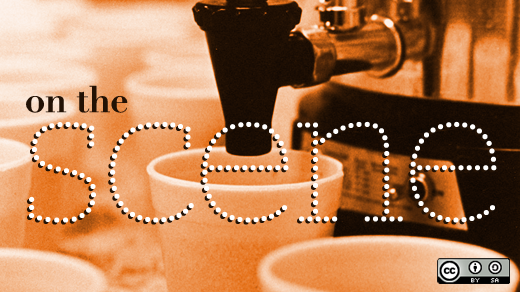LibrePlanet is a yearly gathering of free software activists, users, and contributors—and, it's my favorite conference of the year. Here's why.
LibrePlanet is run by the Free Software Foundation, and has steadily evolved from a yearly members' meeting with presentations from staff and board members, to a full blown two-day conference with speakers and attendees from all over the world. The event brings people who care about free software together to talk about the future of the movement, address current challenges, and celebrate successes.
A very special guest
This year's conference opened on the first day with a conversation with Edward Snowden and Daniel Kahn Gilmore called "The Last Lighthouse: Free Software in Dark Times." Snowden was conferenced in via Jitsi, a free software video conferencing tool. The FSF's executive director, John Sullivan introduced both speakers although there couldn't have been a single person in the room who wasn't familiar with the story of the NSA whistleblower and civil liberties champion. In fact, Snowden was greeted with a standing ovation. The appreciation was clearly mutual. Snowden opened with, "What happened in 2013 wouldn't have been possible without free software. I didn't use Windows because I couldn't trust it. I used a Debian machine." He continued, "I get to say thank you to you."
Gilmore and Snowden went on to discuss the difficult task of getting people to separate privacy and security concerns and the critical importance of bringing more people into the free software movement.
Where the rubber meets the road
Much of the rest of the conference focused on getting down to the details of creating the important software that people need, and how to shape projects that are focused on growth. Early on Saturday, Dave Thompson from GNU Guix and Chris Webber from GNU MediaGoblin talked about how to improve the deployment of free software for both technical and non-technical users. Sumana Harihareswara of Changeset Consulting talked about "Inessential Weirdnesses in Free Software," and pointed out several things that projects regularly do that are alienating to new people and advoacting that we work together to eliminate those behaviors. That afternoon, four members of the committee that reviews the FSF's High Priority Projects List was available to discuss it's recent decisons with the wider community. The official conference closed with Karen Sandler, executive director of the Software Freedom Conservancy, musing on the relationship between free software contributors and the companies that are part of our communities.
More community with your community
The unique activist nature of LibrePlanet means that there are several community-organized events surrounding the main conference. Friday afternoon boasted a SpinachCon, where volunteers help projects improve their user experience or their new contributor experience. On Saturday evening, Software Freedom Conservancy members gathered for a brief cocktail hour to discuss legal and policy issues. Serendiptiously, the W3C was also meeting in MIT's Stata center on Sunday to discuss baking DRM into the HTML5 standard. There was a rally and protest against DRM followed by an inter-organizational forum with Richard Stallman (FSF), Joi Ito (MIT Media Lab), Danny O'Brien (EFF), and Harry Haplin (W3C).
Whatever the W3C decides, you can count on it either being lauded or condemned at LibrePlanet next year.




6 Comments